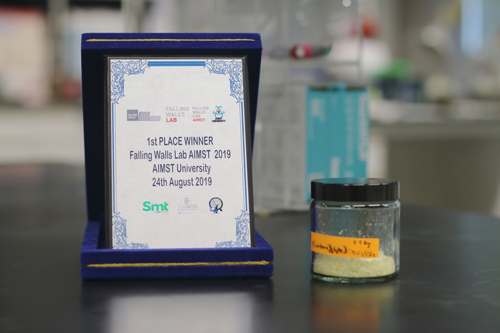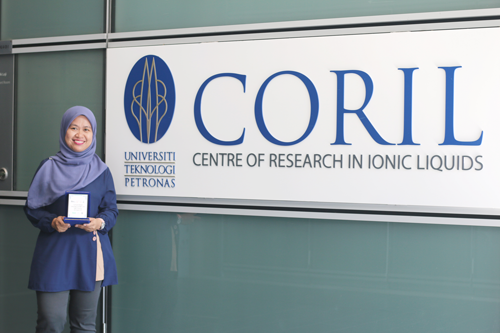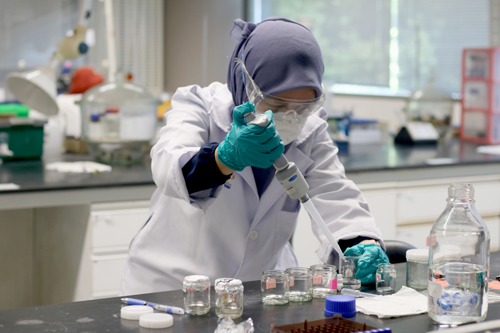Dr. Maisara’s Carbon eating Adsorbent captures Harmful Industrial CO2 Release
Environmental activist moves industrial peril back to nature and science
After finishing up a long day at the lab a week before the Falling Walls competition, Dr Maisara Shahrom Raja Shahrom, a postdoctoral researcher at UTP’s Centre of Research in Ionic Liquids (CORIL) pondered life’s big questions with a philosophical musing. As she pictured the most beautiful trees she’d seen, Dr. Maisara thought about being rooted.
 Earlier this year, Dr. Maisara won the local rounds of the Falling Walls science competition, an international interdisciplinary exchange on science and society. Her three-minute talk, titled “Breaking the Walls of CO2 Capture in Greenhouse Gases” was declared the best pitch.
Earlier this year, Dr. Maisara won the local rounds of the Falling Walls science competition, an international interdisciplinary exchange on science and society. Her three-minute talk, titled “Breaking the Walls of CO2 Capture in Greenhouse Gases” was declared the best pitch.
“With where we’re at right now, in the climate crisis, I’ve been thinking a lot about the problem of being too calm. It’s also about focusing on the fact that I don’t want to be out here making people terrified of climate change. I remind myself that, when we aren’t screwing things up, we are really lucky to live on a planet that we are adapted to and that is incredibly generous with them sustaining many forms of life," Dr Maisara says.
This 8th of Nov, Dr. Maisara will be packing her research project to have a go at the competition’s flagship meeting in Berlin, where leaders from science, industry and policy-making meet. At the grand finals, she will go up against other winners from 100 countries. No doubt, she relishes the big stage. But now, only results matter as she will be judged by prominent science movers and shakers.
However, Dr. Maisara is not intimidated by the challenge. She first came across the idea to use nature-inspired resources to combat climate change some years ago. She says it’s the only way she’d do it—to go back to the way nature has taught us.
 Her research product is a derivative of the green salt. It is an adsorbent called ionic liquid that can be used to capture harmful carbon dioxide (CO2) release. Currently, she finds most industry players are using amine, a substance harmful to the environment.
Her research product is a derivative of the green salt. It is an adsorbent called ionic liquid that can be used to capture harmful carbon dioxide (CO2) release. Currently, she finds most industry players are using amine, a substance harmful to the environment.
Beyond innovation, Dr. Maisara is fighting for more than just the competition’s main prize. If you care about global warming at all, we should prioritise joint-efforts to save the environment she stresses. As such, Dr. Maisara is calling for a tilt in regulation. According to her, in Malaysia, not all industrial sites do their bit to capture their CO2 release.
That said, Dr Maisara says this is why we need to ask ourselves some hard-hitting questions to cut through the noise and arrive at the truth. She says that industry players need to do more to counter-act their reckless profit pursuit.

She has since been drawn to the idea of carbon-eating trees and pledges to contribute in erasing carbon emissions. The process is pretty straightforward conceptually. Trees don’t harm us she shares. They are good for us. Similarly, by using a green adsorbent, we can reverse harmful effects of industrial waste.
Additionally, as part of the prize package, Dr Maisara has chosen the Max Planck Institute, Postdam, Germany for her research visit. There, she will be giving a talk about her innovation.
Apart from raising the alarm about climate change, Dr. Maisara wants to promote the adoption of environmentally-friendly practices among Malaysian companies. To a degree, she aims to correct some of the oversteer caused by rapid industrial development. Perhaps, the best trade-off for our greed is sharing our environmental responsibility, she says.
There is no better anecdote to demonstrate how trees are looking out for us. If we can do more of what trees do to help us, in ways that don’t burden our bottom-line so much, this can rally industry players around our climate salvation cause, she concludes.
Dr. Maisara is another prime example of UTP’s profound industry collaboration. From the work we do, we foster long-term relationships with our global social-impact partners to prepare our students, people and researchers as global citizens. As a leading university in science and technology, our industry-connected learning aspires to overcome infrastructure and capability deficit across all sectors and industries.
Published on 5 November 2019

